OTC

Ear care: A guide for pharmacy teams
In OTC
Bookmark
Record learning outcomes
How can pharmacy teams identify customers who would benefit from having their hearing checked or need help managing minor ear problems?
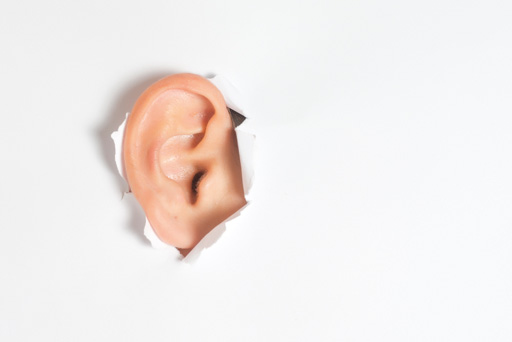
Learning objectives
After reading this feature you should be able to:
• Identify those customers who may have a hearing problem
• Recommend self-care measures to manage minor ear problems
• Signpost those needing more information on specific ear conditions
Earwax helps to protect, clean and lubricate the ears and usually falls out of the ears on its own. Some people are prone to excessive amounts of earwax, which can cause pain, itching and sometimes hearing loss. The NICE guidance on hearing loss in adults recommends that GPs offer to remove earwax with ear irrigation (but not manual syringing) if the earwax is contributing to hearing loss or other symptoms.
Excess earwax can often be treated with OTC eardrops to soften the wax so that it falls out more easily – and pharmacists are ideally placed to offer treatment advice before customers visit a GP. “If customers get a build-up of wax in their ears, this can cause some hearing loss,” says Aamer Safdar, Royal Pharmaceutical Society English Pharmacy Board member.
“They often see a pharmacist first, as this is easier and more accessible than making an appointment with a GP. Olive oil, sodium bicarbonate and OTC earwax products may help to loosen the wax and ease the symptoms. It is important to ask the right questions, however, to check that the customer has excess earwax, rather than anything more serious, and they should be referred to their GP if they have any pain in the ears or the hearing loss is substantial or continues.”
One key message for pharmacists to get across to customers is that using cotton buds and other small objects to clean the ears can cause long-lasting damage. A recent survey by Earex found that one in nine people suffer with excess earwax and use cotton buds to remove this wax, yet over 80 per cent were aware that this isn’t recommended. Using cotton buds could damage the ear canal and eardrum, and push the wax further down into the ear.
“When people come to the GP with ear issues, it often becomes apparent that they are guilty of using cotton buds,” says GP Roger Henderson. “Although people can find this satisfying and believe cotton buds are designed for use in the ears, they actually cause more harm than good. Cotton bud use can push wax further into the ear, impacting it and making ear problems worse. The golden rule is that you should never put anything smaller than your elbow in your ear. Your ears are very sensitive, so when you put anything inside you are at risk of damaging their sensitive lining.”
Key facts
• There are around 11 million people in the UK with some form of hearing loss
• Research is revealing a link between hearing loss and dementia
• Loud noise can cause a profound loss of hearing
Inflammation
Otitis externa (inflammation of the outer ear canal) is often referred to as swimmer’s ear, as it can be triggered when repeated exposure to water strips the protective lining from inside the ear canal. Other causes include allergies, infection or irritation caused by a hearing aid, ear plug or cotton bud, or chemical irritation (e.g. from hair dye).
According to Dr Amy Bibby, head of operations at Qured healthcare app, pharmacy customers should be encouraged to keep their ears dry. “This will help to stop bacteria from entering the ear canal,” she says. “Otitis externa can be painful, itchy and result in hearing loss. Moving the jaw may also be painful and the lymph glands in the neck may be swollen.”
Southampton GP Dr Penny Ward recommends OTC measures to settle otitis externa symptoms and also middle ear infections. “Paracetamol alongside acetic acid ear drops are particularly useful for otitis externa,” she says. “Other products also offer pain relief with a blend of herbal, non-steroidal and anti-inflammatory ingredients. Treatment for middle ear infections tends to be for symptomatic relief of pain and fever symptoms, which can be relieved by painkillers such as paracetamol and ibuprofen. There is no evidence that antibiotics speed up the healing process of otitis media and many cases are viral anyway.”
Other ear conditions seen in the pharmacy setting include glue ear (causing hearing loss) and tinnitus (noises in the ear). Both of these conditions usually need to be referred, although tinnitus can be due to excess earwax or nasal congestion, which may be managed with OTC remedies. If customers are prescribed ear drops or use OTC products, it is important they are shown how to use them properly and reminded that ear drops should be discarded 28 days after opening.
NICE advice on otitis media
National Institute for Health and Care Excellence (NICE) guidance on middle ear infections (acute otitis media), published in March 2018, states that the most effective way to manage the condition is with self care and regular doses of paracetamol or ibuprofen for pain. This self-limiting infection usually lasts for around three days, and antibiotics make little difference to the symptoms.
Any red flag symptoms, such as severe pain, fever, vomiting, fluid from the ear or hearing loss (especially sudden and/or on one side), will require referral to a GP but middle ear infection (if the symptoms are mild) can often be managed in the pharmacy setting.
NICE guidance on hearing loss in adults (published in June 2018) says that if adults present for the first time with hearing difficulties, or GPs suspect hearing difficulties, they should exclude impacted wax and acute infections such as otitis externa – both of which can often be treated with over-the-counter products and advice.
Noise-related hearing loss
Many people seek advice about tinnitus symptoms – buzzing, whistling or whooshing sounds in the ears, often after being exposed to loud noise. According to Action on Hearing Loss, the safe exposure time to listen to music at 85dB is eight hours. To put this into context, the equivalent of 85dB is the sound of a food processor. In nightclubs or concerts, noise levels are often over 100dB, which means someone can only safely listen to music for 15 minutes if they are not wearing ear plugs.
“There are around 11 million people in the UK with some form of hearing loss and around one in 10 adults with tinnitus,” says Gemma Twitchen, senior audiologist at Action on Hearing Loss. “Exposure to loud noise, such as on a night out or from your personal music player, can affect your hair cells, a bit like the way a fresh patch of grass is affected by someone trampling over it. After a few times, the grass will stand upright and tall. However, over time if people continue to trample over it, it will become flat – much like the hair cells in your ears.”
In September 2018, Action on Hearing Loss revealed that most people have experienced ringing in the ears after a night of partying, but six million are living with it all the time. It can occur after exposure to loud noise in places like clubs and bars. According to a recent online poll by the charity, 72 per cent of 800 people said they would wear earplugs if they were provided in a nightclub.
If symptoms of tinnitus are experienced for longer than 24 hours, Action on Hearing Loss recommends visiting a GP. “Noise-related hearing loss can be profound and [its effect is] often underestimated,” says Aamer Safdar. “It may be only temporary and hearing can return after a few hours as the ears slowly reset themselves, but it can also lead to permanent damage, so customers should see their GP if their symptoms continue.”
Community pharmacies are ideally placed to offer advice on preventing noise-related hearing loss and to stock suitable earplugs. “Those at risk of this type of hearing loss are advised to wear musicians’ earplugs during noisy activities (for example: while at clubs or concerts, or mowing the lawn) that allow a person to hear conversation and music but reduce the harmful effect of high sound levels,” says Dr Bibby. “Furthermore, when listening to music, it is best to use over-the-ear headphones instead of earbuds, and to turn down the volume to 60 per cent.”
Action on Hearing Loss stresses that modern earplugs are discreet, don’t block out the music (only the dangerous frequencies) and don’t get in the way of having a good time.
“We don’t want people to stop going to music events – that’s not what this is about,” says Gemma Twitchen. “There is a misconception that if you wear earplugs you can’t hear or enjoy the music, but this is simply not true. Earplugs will block out the dangerous sound frequencies, while still allowing you to listen to the music and enjoy it.”
Tips on noise protection
• Wear earplugs to concerts and other noisy spaces such as gyms
• Invest in noise-cancelling headphones when listening to music – this will help to avoid having to turn the music all the way up to hear it over background noise. It can also help protect hearing against loud transport such as tube trains
• If customers are in a club or at a gig, they should consider going outside and taking ‘noise breaks’
Age-related hearing loss
Around 40 per cent of people over 50 years in the UK have some form of hearing loss, especially the loss of high frequency sounds. Age-related hearing loss (presbycusis) is caused by general wear and tear of the cochlea. Other risk factors for hearing loss include family history, prolonged and regular exposure to loud noises in early life, certain medicines (e.g. chemotherapy and some antibiotics such as gentamicin), and ear inflammation or infections.
Hearing loss often creeps up gradually, so pharmacy customers may not notice changes straightaway. However, it can eventually become frustrating if someone is unable to understand speech (especially in background noise) and even dangerous if they can’t hear warnings.
Increasingly, research is also revealing a link between hearing loss and dementia. In December 2017, researchers based at Trinity College Dublin reviewed and analysed the results of 36 different studies and found that age-related hearing loss had a small but significant association with cognitive decline and dementia.
In March 2018, the British Irish Hearing Instrument Manufacturers Association (BIHIMA) reported on a large French study, which found that people who said they had hearing loss and didn’t use hearing aids had a significantly higher risk of developing dementia than those who had normal hearing or who had hearing loss and did use hearing aids.
The new NICE guideline on hearing loss in adults notes the importance of dementia services being alert to hearing loss, and recommends that healthcare professionals should consider referring adults with diagnosed or suspected dementia for a hearing assessment.
“Hearing loss is a health condition that affects over 5 per cent of the global population,” says Thomas Behrens, chief audiologist at hearing aid manufacturer Oticon. “Sadly, many are living with their hearing loss completely unaware of the adverse effects that it could be having on their overall health. Socialising at family dinners and on nights out with friends is a great way to exercise the brain and with the help of hearing aids could help people living with hearing loss to reduce their risk of cognitive conditions, including dementia, especially in later life. Hearing well not only makes interaction possible, but also more enjoyable.”
It is not always easy for people to tell if they are losing their hearing, which is why problems are more likely to be picked up by friends, family or work colleagues. If someone wants to check their own hearing in private or in the comfort of their own home, they can access the Action on Hearing Loss hearing test on its website (actiononhearingloss.org.uk/hearing-health/checkyour- hearing) or over the phone (0844 800 3838). If they then suspect there is a problem, they need to see their GP.
Mr Sherif Khalil, consultant ENT surgeon at Highgate Private Hospital, says that the commonest signs and symptoms of gradual hearing loss include:
• Difficulty hearing other people clearly, and misunderstanding what they say, especially in noisy places, and asking people to repeat themselves
• Listening to music or watching television loudly, especially if other people find the volume too loud
• Having to concentrate hard to hear what other people are saying, to the extent that it can be tiring and/or stressful
• Experiencing noises (tinnitus) in the ears.
Why age is irrelevant
We all know that hearing deteriorates as we get older, which tends to lead those under a certain age to put off having a hearing test. However, there is no such thing as ‘too young’ for a hearing test, says the Hearing Care Partnership. “Hearing can start to deteriorate as early as the age of 25 years and by the time we hit 50, more than 40 per cent of us will have some level of high-frequency hearing loss.
“Prevention is the best form of treatment – the earlier a condition is detected, the more that can be done to reduce the risk of experiencing hearing loss. That is why considering the protection of your hearing from an early age is a sensible idea.
“Anyone who likes to play music loud in the car, is a festival lover or attends nightclubs regularly could be damaging their hearing without realising. Wearing hearing protection, or simply turning down the volume a little, would drastically reduce the risk of hearing loss because, once the hair cells that capture sound within the ear are permanently damaged by exposure to loud noise, they cannot be repaired.”
Hearing loss can be life-changing, but booking a hearing test, just as you would an eye test, will help to guarantee that any problems are spotted early, says the company. Instead, it currently takes an average of ten years for sufferers to address a hearing condition.
Hearing aid usage
Hearing aids don’t restore hearing to normal levels but they can help people hear more clearly. Embarrassment is often one of the main reasons why people are reluctant to try them as they worry that their hearing aids will be very visible to others.
Research by Action on Hearing Loss for Deaf Awareness Week in May 2018 found that nearly nine out of 10 respondents felt there was still a stigma surrounding hearing loss. Many respondents highlighted how deafness and hearing loss is still something that people make fun of, and that people still feel the need to hide their hearing aids.
“The results of this poll show that we still have a really long way to go,” says Paul Breckell, chief executive at Action on Hearing Loss. “It is shocking that 89 per cent of the 1,122 of people who responded felt that they were being stigmatised and discriminated against, and many described instances of being teased about their deafness – something that would be unthinkable for other conditions. The fact that many also spoke about the emphasis on ‘discreet’ hearing aids and hiding them demonstrates that there is still embarrassment about wearing them, which in this day and age is also shocking.”
NICE guidance suggests that healthcare professionals consider using motivational interviewing or engagement strategies and goal setting when discussing hearing aids with adults for the first time, to encourage acceptance and use. Healthcare professionals should also show the actual hearing aids and discuss their suitability with each individual. There are a variety of different hearing aids available and it is now possible to get modern, digital hearing aids for free on the NHS, as well as privately.
Adjusting to new hearing aids can take up to several months – so it is important that people ask for help if they are experiencing problems. According to Aamer Safdar, pharmacy customers should be encouraged to persevere. “If pharmacy customers have a significant level of hearing loss, they may misinterpret words, which could be important when trying to explain how and when to take medicines, for example,” he says.
“At first, they may experience some problems with hearing aids, such as hearing everything around them, even things they wouldn’t usually hear. The brain needs to retrain itself to filter out background noises, such as newspapers rustling or even people’s conversations. This can take a while. Customers can learn to adjust the settings and use the loop system at banks and cinemas.”
Pharmacy customers should also be given clear guidance about the care and maintenance of hearing aids. If they have NHS hearing aids, they should be able to get free batteries from any NHS audiology service or ear, nose and throat department with a battery service.
Action on Hearing Loss runs free hearing aid support sessions across the UK for people who use NHS hearing aids, providing a repair service and useful information. Battery replacements may be included in a private hearing aid plan, but pharmacies can also stock hearing aid batteries and learn how to fit them.

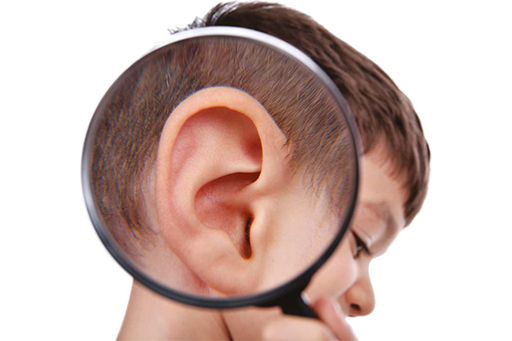 Otitis externa (inflammation of the outer ear canal) is often referred to as swimmer’s ear, as it can be triggered when repeated exposure to water strips the protective lining from inside the ear canal. Other causes include allergies, infection or irritation caused by a hearing aid, ear plug or cotton bud, or chemical irritation (e.g. from hair dye).
Otitis externa (inflammation of the outer ear canal) is often referred to as swimmer’s ear, as it can be triggered when repeated exposure to water strips the protective lining from inside the ear canal. Other causes include allergies, infection or irritation caused by a hearing aid, ear plug or cotton bud, or chemical irritation (e.g. from hair dye).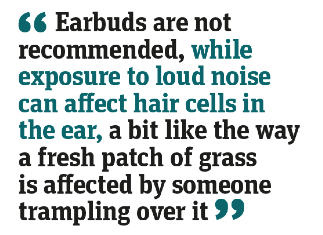
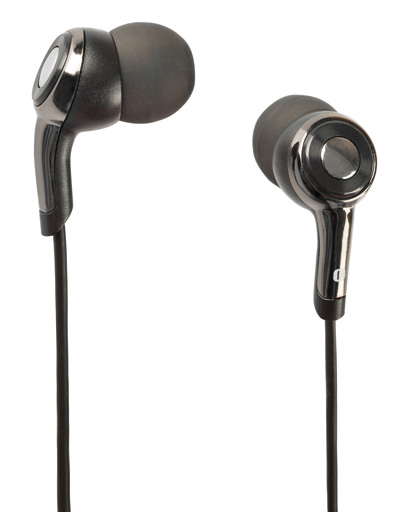 Many people seek advice about tinnitus symptoms – buzzing, whistling or whooshing sounds in the ears, often after being exposed to loud noise. According to Action on Hearing Loss, the safe exposure time to listen to music at 85dB is eight hours. To put this into context, the equivalent of 85dB is the sound of a food processor. In nightclubs or concerts, noise levels are often over 100dB, which means someone can only safely listen to music for 15 minutes if they are not wearing ear plugs.
Many people seek advice about tinnitus symptoms – buzzing, whistling or whooshing sounds in the ears, often after being exposed to loud noise. According to Action on Hearing Loss, the safe exposure time to listen to music at 85dB is eight hours. To put this into context, the equivalent of 85dB is the sound of a food processor. In nightclubs or concerts, noise levels are often over 100dB, which means someone can only safely listen to music for 15 minutes if they are not wearing ear plugs.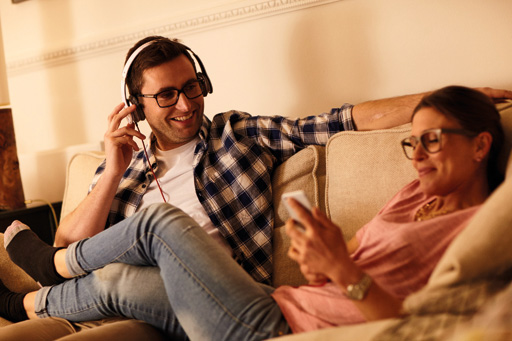
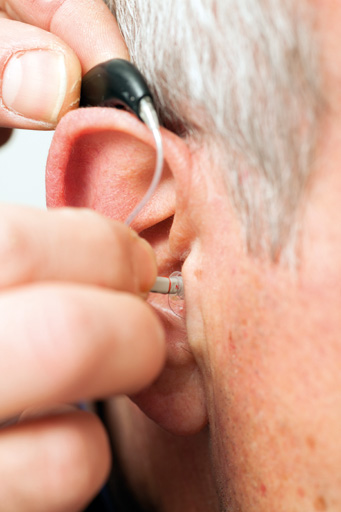 Hearing aids don’t restore hearing to normal levels but they can help people hear more clearly. Embarrassment is often one of the main reasons why people are reluctant to try them as they worry that their hearing aids will be very visible to others.
Hearing aids don’t restore hearing to normal levels but they can help people hear more clearly. Embarrassment is often one of the main reasons why people are reluctant to try them as they worry that their hearing aids will be very visible to others.